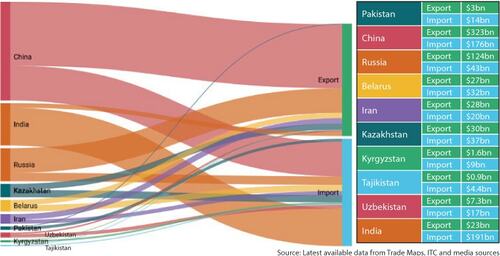The Shanghai Collaboration Association (SCO) incorporates central parts like India, Russia, and China, yet exchange inside the coalition stays far underneath its true capacity. While China overwhelms worldwide products, including to individual SCO individuals, the equivalent can’t be said for other people.
The largest economies of the SCO, China, India, and Russia, drive much of the intra-bloc trade, primarily in energy, manufactured goods, and raw materials. India’s imports to a great extent come from China and Russia, while Russia generally exchanges with China and products to India. Pakistan’s true exchange inside the SCO is peripheral. While smuggling and informal trade occur across Iran’s borders, Pakistan’s formal trade deficit with SCO nations increased by more than 40% in the most recent fiscal year to $11.7 billion, primarily due to Chinese imports.
China, Russia, and Iran have firsthand experience with the West’s use of tariffs and sanctions, which is a common complaint among SCO members. India, on the other hand, is frequently regarded as aligned with the United States, and Pakistan, which relies on the IMF for financing and serves as a major export market, are members of the bloc. These different, once in a while clashing interests in an enraptured world frustrate the SCO from successfully accomplishing shared objectives, restricting its true capacity as a durable financial power.
Distributed in Sunrise, The Business and Money Week by week, October 21st, 2024
Follow Sunrise Business on Twitter, LinkedIn, Instagram and Facebook for bits of knowledge on business, money and tech from Pakistan and across the world.



